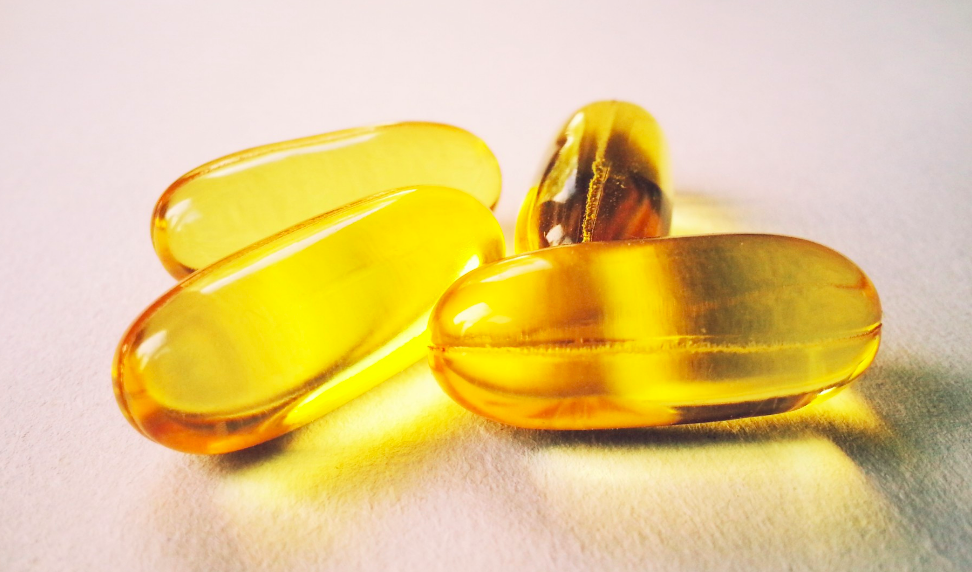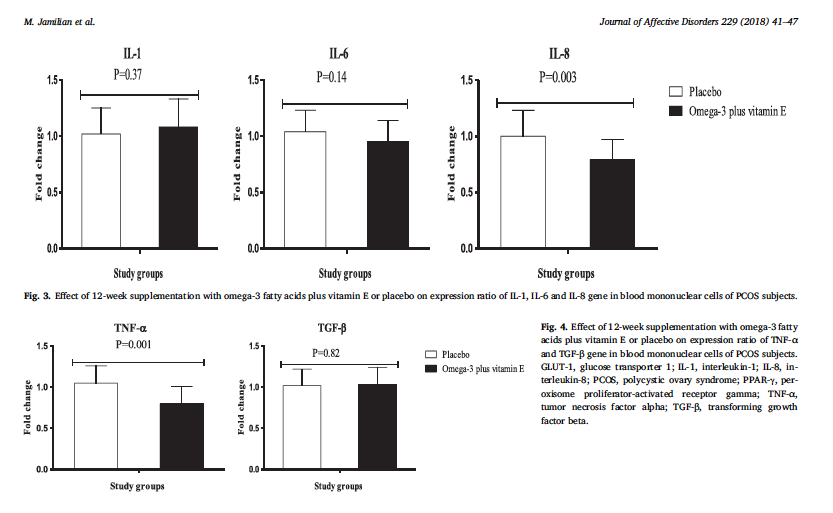Sometimes, a really simple approach can yield extraordinary results. A study (1) on depression in women with PCOS has shown that combining two very foundational supplements that can be easily found—Omega 3 fatty acids and vitamin E—were effective in treating depression and anxiety after just 12 weeks of daily use.
The study followed 40 women with PCOS who were matched for body mass index (BMI) and age. They were given 1000mg of Omega 3 fatty acid supplements and 400IU of vitamin E daily (or placebos which looked exactly the same in appearance), and were told to otherwise maintain their usual daily routines. They were given food and physical activity records, and were also given three of the most common mental health inventory tests(BDI, GHQ, and DASS tests) at both the beginning and end of the study. These tests measure depression, anxiety, and stress, and are standards in measuring mental health markers.
These were measured in each woman, along with their gene expression of PPAR-Gamma (a special hormone receptor found in fat cells), as well as inflammatory cytokines—the body’s chemical messengers involved in inflammation, which are normally quite high in women with PCOS. They also checked the women’s insulin levels and HOMA-IR.
Related link: Branched Chain Amino Acids (BCAA) in Dairy, and Insulin Resistance
After 12 weeks, even when adjusting for age, body mass index, and the improvements in their androgen levels (which is also an excellent fact!), the women who received the omega 3 and vitamin E supplements had significant improvements in mood in all three mental health scores, versus those in the placebo group.</P
There was also an increase in the expression of the PPAR-Gamma gene, which produces a special hormone receptor found primarily in fat cells.
We know that dysfunctional fat cells are a central problem in PCOS: they cause one of the major underlying inflammatory factors in PCOS, which is known as lipotoxicity. Interestingly, in the women who were given the Omega 3 and vitamin E supplements, genetic expression of these PPAR- Gamma hormone receptors actually increased in this short period of time.
We know from a fairly decent body of research that PPAR-Gamma receptors seem to have a beneficial effect on metabolic conditions like diabetes and PCOS. It has also been found that increasing these receptors is also neuroprotective, which is interesting when you see the improvements in depression and anxiety that were found in this study.
PPAR-Gamma receptors are sensors of the body’s lipid function and they have a major role in regulating lipid metabolism. These receptors also inhibit inflammatory gene expression (2). Omega 3 fatty acids are natural ligands of this receptor, and so it is thought that they can cause more of these beneficial receptors to be produced. Combined with vitamin E, which is a fat-soluble antioxidant, the effect of these two supplements may be synergistic!
Once the study was completed, we saw that the expression of these beneficial fat hormones definitely increased. Also, in the above photo taken from the study, it can be noted that there was also a significant decrease in the inflammatory cytokines measured, like IL-8 and TNF-alpha! These are strong, inflammatory cytokines often found in increased levels in women with PCOS… and people with depression have also been found to have increased levels of these cytokines. Many studies have shown that women with PCOS are much more susceptible to depression and anxiety than those without it(3), and it is possible that inflammation plays a strong role considering the results of this study and others.
This has been interesting to delve into, as it’s the first study done that has explored the genetic expression of inflammatory markers specifically from fat tissue, and how they might impact mood. Even more fascinating is the simplicity of using basic supplements to improve them. We knew that Omega 3 can absolutely decrease some of these inflammatory markers, and cause dramatic improvements in mood, but before this study was published we hadn’t seen these effects on mood specifically associated with the function of our fat cells.
Article References:
- Jamilian M, Shojaei A, Samimi M, Afshar Ebrahimi F, Aghadavod E, Karamali M,Taghizadeh M, Jamilian H, Alaeinasab S, Jafarnejad S, Asemi ZThe effects ofomega-3 and vitamin E co-supplementation on parameters of mental health and geneexpression related to insulin and inflammation in subjects with polycystic ovary syndromeJ Affect Disord2017 Dec 28;229:41-47.https://www.jad-journal.com/article/S0165-0327(17)32096-7/fulltext
- Warden A, Truitt J, Merriman M, Ponomareva O, Jameson K, Ferguson LB, Mayfield RD, Harris RALocalization of PPAR isotypes in the adult mouse and human brainSci Rep2016 Jun 10;6:27618.
- Cooney LG, Dokras ADepression and Anxiety in Polycystic Ovary Syndrome:Etiology and TreatmentCurr Psychiatry Rep2017 Sep 20;19(11):83.doi:10.1007/s11920-017-0834-2
- Photos viapublicdomainpictures, Wikimedia Creative Commons, and the cited study


